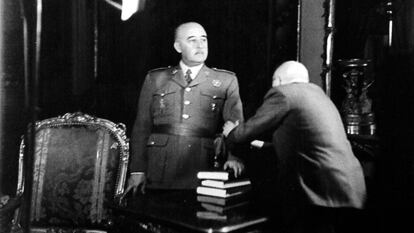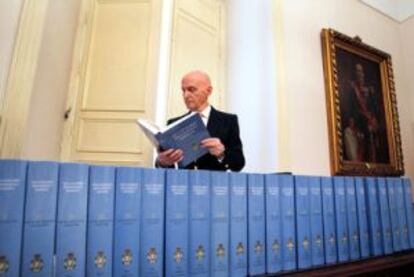Francisco Franco was a dictator after all, Royal History Academy concludes
State-funded body rewrites several definitions in controversial biographical encyclopedia

When the print edition of the Diccionario biográfico español (or, Dictionary of Spanish Biographies) was published in 2011, eyebrows were raised and the column inches began to flow. The reason was the entry within the encyclopedia of historical biographies for Francisco Franco, which failed to define the Spanish general as a dictator.
But now, a digital version of the publication is likely to correct that entry.
In 2011, a campaign was started to get the head of the Royal History Academy to resign
The 2011 edition caused outrage with its explanation as to how Franco “created an authoritarian regime, though not a totalitarian one, since the political forces that supported him were unified into a Movement and subjected to State control.”
The online version, however, will see Franco defined as a dictator, according to Carmen Iglesias, the new director of the Royal History Academy, the state-funded body that produced the work.
The author of the original definition, Luis Suárez, is an expert in medieval history who enjoyed nearly exclusive access to the archives of the Francisco Franco Foundation, until the documents were digitalized through public funding.
The online edition of the Diccionario could be available for consultation by year’s end, Iglesias told the Cadena SER radio network. The print edition is made up of 50 volumes, and includes around 40,000 biographies.
While some parts of the reference work may be consulted for free, in-depth research will be subject to a fee, said Iglesias, who replaced the controversial Gonzalo Anes in December of last year. She is the first woman to head the institution, which was created in 1738 and is known for its conservatism and love of tradition.
In June 2011, a popular campaign was started to get Anes, then 77 years old, to resign from the Royal History Academy after he told EL PAÍS that the academy may lack women, but that “a historian needs many hours for archive research. And alas, for women those thousands of hours are spent raising their children and being housewives.”

This statement added fuel to a fire that was already raging due to several descriptions of 20th-century historical characters that were perceived as subjective and pro-conservative.
As a result, in June 2011 the academy created a committee to review and correct the Diccionario, pressured by then-Education Minister Ángel Gabilondo and by the fact that several political groups in parliament decided to freeze all state subsidies to the research body until the review process was completed.
A group of four in-house academics (including the current director, Carmen Iglesias) and two outside historians examined the descriptions of 500 public figures born between 1875 and 1931, with a special focus on members of the military, the Church and politicians. Their conclusion was that one entry should be deleted altogether, 14 reviewed “entirely” and 16 partially rewritten. Four were said to contain “debatable content.”
So far, none of these recommendations have been implemented, although they are likely now to be reflected in the digital edition of the Diccionario.
Tu suscripción se está usando en otro dispositivo
¿Quieres añadir otro usuario a tu suscripción?
Si continúas leyendo en este dispositivo, no se podrá leer en el otro.
FlechaTu suscripción se está usando en otro dispositivo y solo puedes acceder a EL PAÍS desde un dispositivo a la vez.
Si quieres compartir tu cuenta, cambia tu suscripción a la modalidad Premium, así podrás añadir otro usuario. Cada uno accederá con su propia cuenta de email, lo que os permitirá personalizar vuestra experiencia en EL PAÍS.
¿Tienes una suscripción de empresa? Accede aquí para contratar más cuentas.
En el caso de no saber quién está usando tu cuenta, te recomendamos cambiar tu contraseña aquí.
Si decides continuar compartiendo tu cuenta, este mensaje se mostrará en tu dispositivo y en el de la otra persona que está usando tu cuenta de forma indefinida, afectando a tu experiencia de lectura. Puedes consultar aquí los términos y condiciones de la suscripción digital.








































